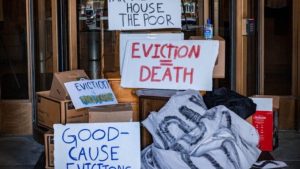 Prior blog posts have discussed the concept of surplus monies in foreclosure proceedings. When a foreclosed property is sold at public auction, the winning bid may exceed the total amount owed to the entity foreclosing on the property. In such a case, the excess funds are considered “surplus funds,” and the Court-appointed Referee will then deposit the surplus funds with the New York State Department of Finance, which has the authority to disburse the funds to the proper party, upon receipt of a Court order from the Court that handled the original foreclosure case.
Prior blog posts have discussed the concept of surplus monies in foreclosure proceedings. When a foreclosed property is sold at public auction, the winning bid may exceed the total amount owed to the entity foreclosing on the property. In such a case, the excess funds are considered “surplus funds,” and the Court-appointed Referee will then deposit the surplus funds with the New York State Department of Finance, which has the authority to disburse the funds to the proper party, upon receipt of a Court order from the Court that handled the original foreclosure case.
The question of who exactly is the “proper party” is one that our firm has encountered fairly often. There are several situations in which more than one entity may have claims to the surplus funds. This post will further discuss those situations.
In general, the original owner of the property (prior to the foreclosure sale) has the first claim to any surplus funds. If it is an individual, he can retain experienced counsel to file the proper motion papers to obtain a Court order allowing disbursements of the funds. There may be situations where the property was owned by a corporation or other entity with multiple owners. In such cases, the entity itself would be entitled to the surplus funds. If it is a corporation, the funds would be payable to the corporation itself. The corporation’s governing documents would then determine how the corporation would disburse the funds.












